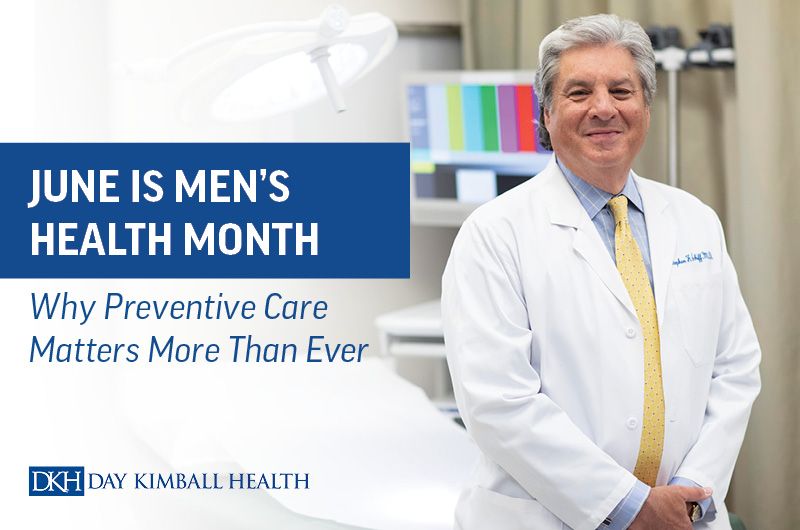
June Is Men’s Health Month: Why Preventive Care Matters More Than Ever
06/13/2025Authored by Stephen F. Schiff, MD, FACS
Urologist, Day Kimball Health
June is Men’s Health Month, a time to encourage men to take their health seriously, speak openly about sensitive issues, and schedule regular checkups that can lead to early detection and better outcomes. At Day Kimball Health (DKH), we see firsthand the impact that timely care—and unfortunately, delayed care—can have on men in our community.
Whether it’s prostate screenings, blood in the urine, or persistent urinary symptoms, many men tend to wait too long before seeking help. This isn’t just a personal health issue—it’s a community issue. As the leading provider of urologic care in Northeast Connecticut, Day Kimball is committed to helping local men live longer, healthier lives by providing compassionate, comprehensive care close to home.
Prostate Cancer: Early Detection Is Key
Prostate cancer remains one of the most common cancers in men, with approximately one in eight men diagnosed in their lifetime. Thankfully, when caught early, it’s highly treatable. The PSA (prostate-specific antigen) blood test, combined with a physical exam, is our best available screening method.
Although PSA testing was once controversial due to the risk of false positives, current guidelines recommend that men of average risk begin discussing PSA screening with their doctor between ages 50 and 55. Men at higher risk—those with a family history or who are African-American—should consider starting that conversation between ages 40 and 45. For healthy older men with a life expectancy of ten or more years, screening beyond age 70 may still be appropriate.
Common but Overlooked: ED and Urinary Issues
Men’s health also includes concerns that affect quality of life, such as erectile dysfunction (ED). While common, ED is often a sign of other medical conditions—diabetes, high blood pressure, or vascular disease. It can also be exacerbated by smoking, obesity, or poor mental health. A collaborative care approach, involving both urologists and primary care providers, can help address not only the symptoms but also the root causes.
Urinary tract infections in men are uncommon and usually indicate an underlying issue that needs further evaluation. Blood in the urine—whether visible or microscopic—should also prompt immediate investigation. While these symptoms may be easy to dismiss, ignoring them could lead to more serious complications later on.
A Lifetime of Care Starts Early
Younger men are not immune to urologic issues. Testicular cancer, though rare, is most common in younger men and often highly treatable when detected early. Other issues, such as voiding problems, congenital abnormalities, or early signs of hormonal imbalance, also affect younger age groups and should be evaluated promptly.
Lifestyle plays a significant role in long-term men’s health. While diet and exercise may not prevent all forms of cancer, they are critical in preventing cardiovascular disease, improving sexual function, and reducing risk factors for bladder and kidney conditions. Smoking, in particular, is a known cause of bladder cancer and should be addressed through cessation programs or support.
Preventive care starts with a simple step: making an appointment. Many men avoid the doctor until a problem becomes severe—like a kidney stone, a serious infection, or unresolved pain. But establishing care earlier and discussing screenings with a healthcare provider can make a real difference in outcomes. Diagnostic tools are straightforward and usually painless, and most evaluations can provide either reassurance or an early opportunity for intervention.
Men’s Health Month is more than a calendar reminder—it’s a call to action. Early detection saves lives. Open dialogue reduces fear and stigma. And taking care of yourself isn’t just about treating disease; it’s about building a longer, healthier, and more active life. Don’t wait for a crisis. Take the first step now.
To learn more about urology services at Day Kimball Healthcare, visit www.daykimball.org/urology.

